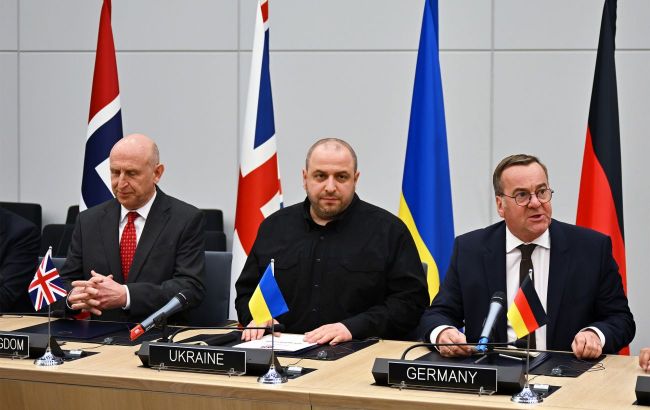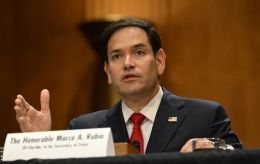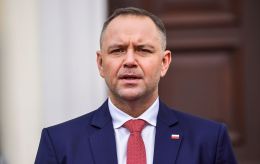Peace delayed? Recap of Ukraine's negotiation week
 Defense Ministers of the United Kingdom, Ukraine and Germany John Healey, Rustem Umerov and Boris Pistorius at the Ramstein meeting (photo: Getty Images)
Defense Ministers of the United Kingdom, Ukraine and Germany John Healey, Rustem Umerov and Boris Pistorius at the Ramstein meeting (photo: Getty Images)
Donald Trump, as the main driver of negotiations to end the Russian-Ukrainian war, was occupied with other tasks this week. Therefore, there was not much diplomatic activity around Ukraine, although there were still some notable events.
Putin spoke with Steve Witkoff, Trump is once again dissatisfied with the progress of negotiations, the US is regrouping troops in Poland, and at "Ramstein" they promise Ukraine record assistance. What does all this mean for the future of the war – in RBC-Ukraine's article below.
Main points:
-
What did Putin and Witkoff talk about?
-
What exactly does Keith Kellogg propose regarding Ukraine?
-
Why is Trump dissatisfied with the Ukraine issue?
-
Is the US withdrawing troops from Poland, and what's with the Ukrainian hub?
-
Where did the Chinese on the front come from?
-
What did Russia and the US talk about behind closed doors?
-
Why hasn't Ukraine signed a minerals agreement with the US yet?
-
Why didn't the US attend Ramstein?
Witkoff’s meeting with Putin
Yesterday, April 11, Donald Trump's special representative on Russia, Steve Witkoff, visited Saint Petersburg, where he met with Vladimir Putin's emissary, Kirill Dmitriev, and later with the Russian dictator himself. There is almost no official information about these negotiations at the moment – the Kremlin limited itself to a brief statement that the talks concerned "aspects of Ukrainian settlement."
Meanwhile, the American outlet Axios writes that Trump has set a new deadline for a ceasefire in Ukraine – by the end of April, otherwise Russia will face new sanctions. During Witkoff’s visit to Russia, the American president wrote on the social network Truth Social that Russia must "get moving" to end the war.
Before his trip to Russia, Witkoff hosted Kirill Dmitriev, whom Putin has appointed de facto chief negotiator with the Americans. According to Reuters, after the meeting with Dmitriev, Witkoff told Trump that the fastest path to ending the war is recognition of the "sovereignty" of the occupiers over the Donetsk, Luhansk, Kherson, and Zaporizhzhia regions of Ukraine.
However, according to the agency, another of Trump’s special representatives – Keith Kellogg – opposed this approach, pointing out that Ukraine will never give up its territories.
Nevertheless, Kellogg himself later caused a stir in the media when he suggested in a comment to The Times that Ukraine could be "divided like Berlin" after World War II: western Ukraine would be controlled by British-French-Ukrainian forces, part of the Left Bank would be held by Ukrainians, and the currently occupied territories would remain with the Russians.
However, Kellogg later accused the agency of distorting his words. As Trump’s special representative assured, he was not talking about "dividing Ukraine," but only about post-war zones of responsibility for different armies. "I was not referring to a partitioning of Ukraine," Kellogg wrote on social network X.
Statements exist, actions don’t
Overall, this week, the main attention of the USA was focused on the trade war launched against most countries of the world, as well as on negotiations with Iran. Negotiations with Russia regarding the end of the war against Ukraine moved to the background, although on April 7, US President Donald Trump stated that he continues negotiations with Russia. At the same time, he expressed dissatisfaction that Russia continues to attack Ukraine.
"I don't like the bombings. The bombing goes on and on. Every week, thousands of young people are being killed. And it's a horrible thing that should have never started, it would have never started if I were president," Trump stated.
On April 10, Deputy Head of the Office of the President of Ukraine Pavlo Palisa stated that Ukraine, during negotiations with Russia, will not accept any limitations on the number or combat readiness of its Armed Forces. Ukraine has also informed the United States about this position.
Against this background, on April 8, the US began relocating its troops and equipment from the Polish airport Jasionka, which since 2022 has served as the main logistical hub for military aid to Ukraine. The command of the US Armed Forces in Europe and Africa explained that such actions are part of a broader strategy to optimize US military operations, improve the level of support for allies and partners, and increase effectiveness.
Chinese prisoners
Ukrainian military during battles in the Donetsk region captured two Chinese citizens who were fighting on the side of Russia. "I think this is a very important element. I think the USA should pay more attention to what is happening today," commented on this event, President of Ukraine Volodymyr Zelenskyy.
In general, there is information about 155 Chinese nationals with surnames and passport data who are fighting on the territory of Ukraine. "We are gathering information, we believe that there are more of them, many more," reported Zelenskyy.
According to him, recruits are being recruited through TikTok and other Chinese social networks, where Russians spread advertisements. Then they arrive in Moscow, after a medical check-up, they go for 1–2 months to training centers, receive migration cards, and cards to which they get paid.
In connection with this, the Ministry of Foreign Affairs of Ukraine summoned the chargé d'affaires of China in Kyiv (temporarily acting ambassador – ed.). According to the Minister of Foreign Affairs of Ukraine Andriy Sybiha, the participation of Chinese citizens in the war against Ukraine casts doubt on China’s position on peace and undermines trust in Beijing as a responsible permanent member of the UN Security Council.
Reacting, the Ministry of Foreign Affairs of China reported that currently it is "clarifying the situation" with the prisoners.
USA–Russia: exchange of courtesies
In Istanbul on April 10, negotiations took place between the USA and Russia regarding the restoration of full-fledged contacts. According to State Department spokesperson Tammy Bruce, the goal of the negotiations is "to try to make progress in further stabilizing the work of bilateral missions." Also, despite the sanctions, the Russian Federation and the USA agreed to partially restore banking services.
The issue of ending Russian aggression against Ukraine was not discussed. But according to Sky News, the discussion included the restoration of direct air traffic between the two countries. At the same time, Bruce emphasized that full normalization of relations between the USA and Russia can happen only after the Russian Federation’s war against Ukraine ends.
On the same day, Russia and the USA conducted another prisoner exchange in Abu Dhabi "as a sign of ongoing strengthening of trust between the countries."
The Russian Federation released US and Russian citizen Ksenia Karelinа, who last year was sentenced to 12 years in a strict regime colony. She was found guilty in Russia of treason for donating 50 dollars to a Ukrainian charity organization in the USA. In exchange, the USA released Artur Petrov, a citizen of Germany and Russia, who was arrested in 2023 in Cyprus at the request of the USA for smuggling microelectronics.
Negotiations between Ukraine and the USA on minerals
On April 11, technical consultations on the agreement about minerals took place in Washington. From the Ukrainian side, teams from the ministries of justice and economy participated in them. Kyiv also appointed an international law firm to advise on the negotiations.
Prime Minister of Ukraine Denys Shmyhal on April 9 named Ukraine's "red lines" in the agreement with the USA on minerals. "First of all, it is our Constitution. Secondly, it is our aspiration to join the EU and our European commitments. Also, it is international law. Also, we understand that it must be a partnership agreement – with equal conditions for both sides," said Shmyhal.
According to Reuters sources, the Friday meeting took place in an "antagonistic" atmosphere due to the large differences between the positions of Ukraine and the USA. Thus, according to the agency, chances for a breakthrough in the negotiations are few for now.
Ramstein and the Coalition of the Willing in Brussels
On April 10, in Brussels, another Coalition of the Willing meeting took place regarding the preparation of a contingent that may be deployed in Ukraine. Following its results, UK Defense Minister John Healey announced the development of a plan to support Ukraine. It provides the following goals: to ensure a safe sky, sea, peace on land, and to support the Ukrainian armed forces so that "they become the strongest deterrent factor."
According to RBC-Ukraine, 5–6 countries agreed to send their military personnel, including the United Kingdom, France, and the Baltic states, who stated that they can provide troops.
Also on April 11, a meeting of the Ukraine Defense Contact Group, known as the Ramstein, took place. The USA still took part in its work – the head of the Pentagon, Pete Hegseth, joined remotely. On the agenda were strengthening Ukraine's air defense, new arms supplies, and the development of defense-industrial cooperation. The total volume of aid announced by partners for Ukraine became record-breaking – over 21 billion euros.
Thus, this week became a continuation of the pause in negotiations regarding the end of the Russian-Ukrainian war.
However, the trip of special representative Witkoff to Russia gives reason to hope that a revival may finally begin on the diplomatic track from next week.
Earlier, RBC-Ukraine explained in detail why such a long pause came in peace negotiations, what intentions Donald Trump has regarding ending the war, and what Vladimir Putin is planning.

